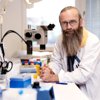Fritextsökning
Artiklar per år
Innehållstyper
-

Glad sommar! – och chefredaktörens lästips
Life Science Swedens chefredaktör sammanfattar året hittills och ger lästips inför sommaren.
-

Lucy Robertshaw: Artificial intelligence – is this really going to transform a patient’s life?
In a column Lucy Robertshaw reflects on how AI and new regulations will affect healthcare, innovation and the lives of future patients.
-

Anna Törner: The minute between life and death
“I have never told anyone about this day that happened more than 20 years ago. But I sometimes reflect on what happened, on what might have happened. When I try to understand why I haven’t told anyone, I find the answer: a feeling of shame. There is no forgiveness for something like this, even though it is very human to be distracted for a moment,” Anna Törner writes in a column.
-

Rapid developments in AI – “All stakeholders are struggling to understand it”
Artificial intelligence is being discussed more and more, and developments in the field are moving rapidly. As the Swedish Medical Products Agency testifies, keeping up with developments is not easy.
-

15 framtidsyrken inom life science: “Huggsexa om kompetens”
Arbetsmarknaden för naturvetare som jobbar med life science har mycket goda framtidsutsikter. Det visar en ny rapport från fackförbundet Naturvetarna.
-

Norwegian company wins bidding battle for Sensidose
The lengthy battle to acquire medical device company Sensidose is apparently over. Generic medicines company EQL Pharma is pulling out, selling its shares and leaving the way open for Norwegian company Navamedic.
-

Samuel Lagercrantz: The government’s performance in healthcare and life sciences so far
Since the change of government in Sweden, developments in the healthcare sector have shown promising signs, but the outlook in life sciences is less promising, writes Samuel Lagercrantz in an editorial.
-

Study: Chat GPT is more empathetic than doctors
The AI tool Chat GPT is not only more accurate when it comes to answering patient questions – the chatbot is also perceived as almost 10 times more empathetic than real doctors, a new study reveals.
-

Antikroppar tog form med hjälp av artificiell intelligens
Språkmodeller, såsom Chat GPT, som bygger på artificiell intelligens kan användas till en rad olika saker. Nu har forskare, med en språkmodell tillverkad av ett välkänt amerikanskt företag, i en ny studie kunnat designa antikroppar, rapporterar Nature.
-

Chat GPT mer empatisk än läkare enligt studie
Chat GPT har inte bara större precision när det kommer till patientfrågor – chattboten uppfattas dessutom som nästan tio gånger mer empatisk än riktiga läkare, enligt en ny studie.
-

Devyser fick Swecares exportpris: "Fantastisk tillväxtresa"
Diagnostik- och gentestbolaget Devyser är vinnare av årets Swecare Export Award för att ha "satt svensk innovation inom hälsa och sjukvård på världskartan". Priset som ”rising star” gick till sepsisbolaget Algodx.
-

Skärpt tillsyn inleds av hälsoappar och AI-program
Läkemedelsverket inleder en särskild satsning på tillsyn av medicintekniska programvaror, som hälsoappar och AI.
-

He got inside the head of Sweden’s vaccine hunter
The hunt for the COVID-19 vaccine is the theme of the new book Vaccinjägaren (The Vaccine Hunter). It tells the story of Richard Bergström’s mission as Sweden’s national vaccine coordinator and the scheming that went on behind the scenes in Europe. Author and medical journalist Nils Bergeå co-wrote the book with Richard Bergström.
-

Conference on Alzheimer’s reveals several advances in the field
In Gothenburg, Sweden, researchers and pharmaceutical companies from all over the world gathered to discuss one specific issue – neurological diseases. Life Science Sweden has talked to some of those that attended the conference.
-

Beslut idag: 17 innovationsprojekt får finansiering
I tuff konkurrens har 17 nya innovationsprojekt inom life science valts ut och får finansiering via Medtech4health och Swelife.
-

Fem saker du måste veta om AI 2023
Är ditt jobb hotat av maskininlärning? Varför är det viktigt att hänga med i utvecklingen inom artificiell intelligens? Här får du svar på vad du behöver veta om AI just nu.
-

AI kräver rätt ledare
Att använda AI inom industrin innebär både möjligheter och utmaningar, det gäller att tänka till för att det ska bli rätt. Och vara medveten om att AI är en strategisk fråga. Vi har lyssnat på ett föredrag om vad man ska tänka på.
-

Meeting with focus on South Korea and Japan’s life sciences
Large, complex and exciting – this is how Britta Stenson, Business Sweden, describes the life science markets of Japan and South Korea, which took centre stage during a webcast seminar.
-

Bör vi vara oroliga att AI tar över våra jobb?
Ingen kan ha undgått att det pratas om AI, artificiell intelligens, överallt. Men bör vi vara oroliga för våra jobb när AI gör entré?
-

Genomic Medicine Sweden inleder samarbete med Microsoft
Genomic Medicine Sweden påbörjar nu ett samarbete med Microsoft med syfte att hantera och öka förståelsen av den data som genereras inom precisionsmedicin.
-

Nästa generation AI kan bli OI
I höstas presenterades hur mänskliga hjärnceller i en odlingsskål lärt sig att spela Dishbrain, en variant av tv-spelet Pong. Nu tas nästa steg.
-

“An entire industry is about to be wiped out”
According to Jennie Ekbeck, CEO of Umeå Biotech Incubators, Sweden risks not having any small diagnostic companies left in five years.
-

Column: ”Life as a F1 race”
"The F1 car makes several pit stops during a race and during a lifetime the human being may also have to come in several times for maintenance", Björn Ursing writes in a column.
-

”AI som både imponerar och skrämmer”
"Tidigare har jag sällan varit särskilt imponerad över något som varit AI-producerat. Men det här är något helt annat", skriver Samuel Lagercrantz i en ledare om Chat GPT och om AI i sjukvården.